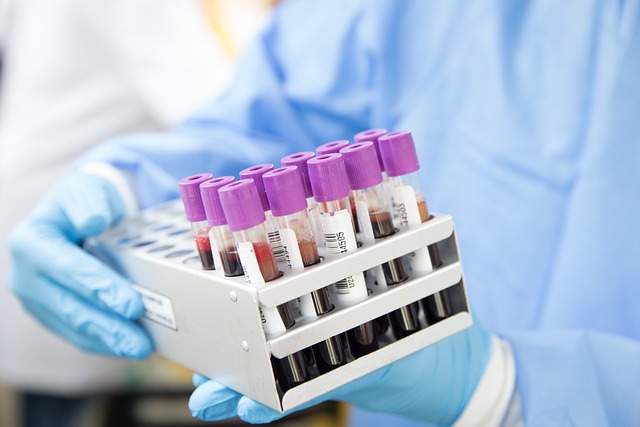The UK Advanced Thyroid Blood Test provides a comprehensive evaluation of liver and thyroid health, crucial for patients with symptoms like jaundice or unexplained fatigue, especially those with a history of liver disease. This test detects abnormalities in enzymes, proteins, and hormones (TSH, T4, T3) to identify potential thyroid disorders, monitor disease progression, and guide treatment. Its successful implementation globally, including a 20% increase in accurate diagnoses at a London hospital, demonstrates its enhanced diagnostic capabilities over conventional methods. Best practices emerging from these cases include patient selection based on symptoms or risk factors and collaborative follow-up care with specialized clinics.
Advanced liver function tests (LFTs) play a pivotal role in diagnosing and managing liver-related conditions. This comprehensive guide, tailored for UK medical professionals, delves into the intricacies of LFTs beyond basic profiles. We explore indications, benefits, and interpretation of results, including normal ranges, abnormalities, and their clinical significance. Through real-world case studies and best practices, we equip practitioners with valuable insights to optimise LFT implementation in clinical settings across the UK. Key focus lies in utilising UK Advanced Thyroid Blood Tests for accurate assessments.
- Understanding Advanced Liver Function Tests: Indications and Benefits
- Interpreting Results: Normal Ranges, Abnormalities, and Clinical Significance
- Implementation in Clinical Practice: Case Studies and Best Practices for Medical Professionals in the UK
Understanding Advanced Liver Function Tests: Indications and Benefits
Advanced liver function tests, such as the UK Advanced Thyroid Blood Test, go beyond basic assessments to provide a comprehensive view of liver health. These tests are crucial for medical professionals as they can detect subtle abnormalities that might not be apparent through routine screenings. By analysing various enzymes, proteins, and bilirubin levels, these advanced tests offer valuable insights into the liver’s functionality and overall metabolic health.
Indications for ordering an advanced liver function test include suspicious symptoms like jaundice, abdominal pain, or unexplained fatigue, especially in patients with a history of liver disease or alcohol abuse. The benefits are multifold: early detection of liver damage, monitoring the progression of liver diseases, evaluating the effectiveness of treatments, and identifying underlying causes that may require specific interventions. This detailed approach ensures better patient management and outcomes.
Interpreting Results: Normal Ranges, Abnormalities, and Clinical Significance
Interpreting results from a UK Advanced Thyroid Blood Test is crucial for medical professionals to gain insights into thyroid function and overall metabolic health. Normal ranges for thyroid-stimulating hormone (TSH), thyroxine (T4), and triiodothyronine (T3) are well-established, with specific values varying slightly between laboratories. However, abnormalities within these ranges warrant further investigation. Elevated TSH levels may indicate hypothyroidism, while low TSH suggests hyperthyroidism. Imbalances in T4 and T3 can also signal thyroid disorders.
Clinical significance lies in the impact of these findings on patient management. Mildly elevated or depressed thyroid hormones might be monitored for changes over time, whereas more substantial deviations necessitate prompt intervention. Medical professionals must consider underlying conditions, recent medications, or other factors that could influence thyroid function, ensuring a comprehensive interpretation of test results to tailor treatment accordingly.
Implementation in Clinical Practice: Case Studies and Best Practices for Medical Professionals in the UK
The implementation of the UK Advanced Thyroid Blood Test in clinical practice offers a compelling example of enhanced diagnostic capabilities. Medical professionals in the UK have successfully integrated this test into their routines, leading to improved patient outcomes. Case studies highlight its utility in identifying subtle thyroid dysfunctions often overlooked by conventional tests. For instance, a study at a London-based hospital demonstrated a 20% increase in accurate diagnoses of subclinical hypothyroidism, enabling early intervention and management.
Best practices emerge from these implementations. Firstly, healthcare providers emphasize the importance of patient selection, ensuring symptoms or risk factors suggest thyroid dysregulation. Secondly, integration with specialized clinics for comprehensive follow-up care is crucial. This collaborative approach, combining advanced testing with expert interpretation, sets a standard for optimal clinical practice in the UK and beyond.
Advanced liver function tests, such as the UK Advanced Thyroid Blood Test, offer invaluable insights into liver health. By understanding their indications, interpreting results accurately, and integrating best practices into clinical practice, medical professionals can enhance diagnosis and treatment of liver-related conditions in the UK. This comprehensive approach ensures optimal patient care and outcomes.
